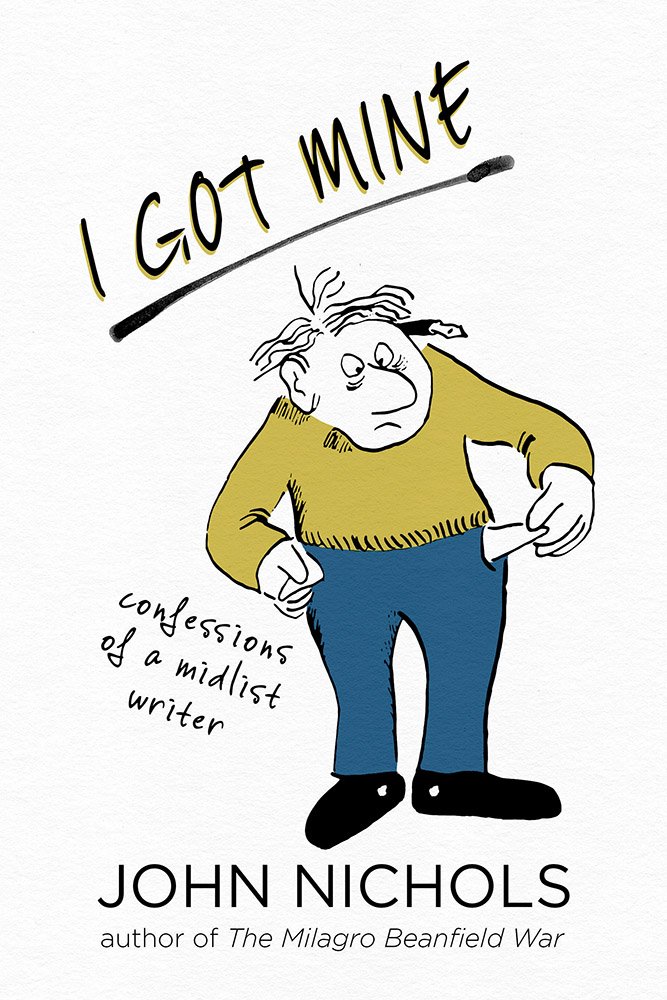I Got Mine: Confessions of a Midlist Writer
By John Nichols
University of New Mexico Press
Hardback, 280 pages, 36 halftones
$27.95
A Review by Pete Warzel
John Treadwell Nichols will be 82 years old this year. He has been writing for much more than a majority of those years, having his first publishing deal for A Sterile Cuckoo, at the age of 23. A wunderkind, for sure. The golden boy.
This memoir by Nichols covers that initial success and the years that follow, up to now, focused on the writing aspects of his 23 novels and non-fiction books, myriad essays, political diatribes, screenplays, and all the work that did not get published along the way. Some of his personal life comes through in this book, some of the marriages, the political engagement, and certainly his pure feelings about Hollywood, but it is really a travelogue through a writing life. In that, it is fascinating.
I once had the opportunity to visit John’s storage shed in Taos many years ago, to view the manuscripts, the endless rewrites, that now reside at the University of New Mexico in the John Nichols archives. I believe it is no joke in this memoir when he cites the astounding 35th draft of his book On the Mesa, a non-fiction love story about the natural world around Taos, that finally came in at 193 pages. All his manuscripts filled a shelf that ran around the shed about the size of a two-car garage. Boxes filled the floor. It was a three-dimensional visualization of this memoir.
The title I Got Mine is taken from the epigram to the book, a two verse quote from a traditional song that tells the tale of a gambler losing all his money at a crap game, but when the police broke up the game someone dropped a bet on the floor, immediately swiped by the narrator on his way out the door. That is a witty analogy to John’s success, or not, as a writer. No money, big money, broke again. The Milagro Beanfield War sells very little, lingers, becomes an underground classic, while the third book in The New Mexico Trilogy, Nirvana Blues, becomes a best-seller in major cities and sends Nichols on his first book tour. Milagro percolates and becomes a film project for Robert Redford, and so up and down, paydirt and paucity.
Nichols rings true when he recalls the screenwriting gigs for Hollywood films, capturing the essence of the biz, as only his sense of humor can do. “So we park, take an elevator to the top floor, and sit down with Eddie Lewis and eight tanned moguls wearing Armani suits… Everyone gets comfortable, politely eats a delicate little cucumber and sprouts sandwich, takes a sip of Pellegrino sparkling water and then the head addresses Costa: ‘Well Costa, tell us what you have in mind’” Perfect. Costa is Costa-Gavras the director of Missing, an outstanding film that Nichols wrote the screenplay for… and got pushed out of the film credit by the Screenwriters Guild. Hollywood politics, a cruel outcome since it won an Academy Award for Best Adapted Screenplay.
He also rings so very true when he talks about his adopted home of Taos, New Mexico. “The stands at Friday or Saturday Taos High football games boasted cheering fans. Overhead, doves flew south trailed by noisy sandhill cranes. The Wednesday drive-in movies featured Tony Aguilar – I parked the family there to learn Spanish and enjoy the music. Lightning streak lit up the western sky as we pigged out on butter-drenched popcorn.” Idyllic, small town America, but in the kingdom of New Mexico, Chamisaville, to some.
There is a sense of endless energy in this book. Nichols writes and writes and rewrites, multiple novels and screenplays at once, while taking time to commit to political protest and engagement, raise a family, remarry and remarry. He describes himself as “…a one man writing factory, working on five novels at once.” My sense is that at 81 he still has a good chunk of that energy left. This book gallops and roars, laughs out loud at the publishing business, the movie business, and at the author himself. John Nichols really never pulled his punches in his writing, or in conversation or protest. This book follows suit. He is ethically consistent in everything he does, like it or not.
Let me close with an opinion. American Blood, a Nichols novel from 1987, breaks the mold of his work, and it is a masterpiece. Like Cormac McCarthy, but in Nichols own style and vision, he explores the undercurrent, no, the heart and soul of America as violent. I remember when it was first published, I bought it and read it in a night and day. It is a powerful, ugly, beautiful piece of writing, and I could not put it down deep into the night. It scared me, as does our country more and more these days. John has written a lot of very good books with his singular sense of humor and love of land and people. American Blood is a work from deeper inside. It was I thought, on that first reading, truly a great novel. I will go back and read it again and hope I was correct. It is, given the past several weeks of repeated mass killings in our country, a reflection of our society, but written 35 years ago. It is timely again, and might be of interest to you, but with a WARNING. It is violent and disturbing. The reviews Nichols includes in I Got Mine might be worth reading before trying out American Blood. A comment Nichols himself makes in this memoir about being asked to write a screenplay of the novel is to the point. “This time around I chickened out of writing a script because I couldn’t deal with the violence.”
So let’s end with this to put it all in perspective. Nichols is on the set of The Milagro Beanfield War in Truchas, New Mexico, 1986. Robert Redford walks by and says “ Oh, John Nichols, are you slumming in Hollywood again?” Enough said. John Nichols has had a wild ride.


